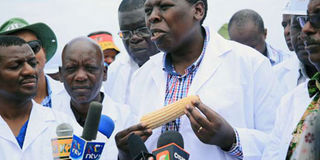Kenya set to gain from food project, says CS Wamalwa

Cabinet Secretary for Water and Irrigation Eugene Wamalwa addresses the media during his visit to Galana-Kulalu Food Security Project on February 12, 2016. He pointed out the project was on course describing it as fundamental for the country’s food security. PHOTO | WACHIRA MWANGI | NATION MEDIA GROUP
What you need to know:
- Cabinet Secretary for Water and Irrigation Eugene Wamalwa cautioned that Kenya must embrace irrigation to fight off food insecurity.
- GKFSP has been identified as a key flagship project to contribute towards achieving the targeted one million acres under irrigation across the country.
The Galana-Kulalu Food Security Project (GKFSP) in Tana River County will harvest the second batch of crops in the next two weeks, despite initial objections from MPs on its implementation progress.
Parliament's Agriculture Committee Chairman Adan Noor said the project is giving Kenyans a lot of hope. He, however, said the implementation pace of the project wasn’t convincing forcing the MPs to suspend it last December after visiting the ranch to review the project’s progress.
“This is a major project which cannot be done in one year but this being a demonstration or model farm, we expect more than what we have seen. The Galana-Kulalu ranch is bigger than what the country has ever achieved in irrigation development since independence and therefore the need for careful planning especially in terms of approach,” Mr Noor said.
However, Cabinet Secretary for Water and Irrigation Eugene Wamalwa cautioned that Kenya must embrace irrigation to fight off food insecurity.
Mr Wamalwa spoke Friday during a visit to the ranch.
“Kenya remains a food insecure nation but we see great potential here of actually removing it from the list of food insecure countries. The answer is in irrigation we can’t continue relaying on rain fed agriculture and expect to feed our growing population which is at 44 million, " he said.
Nonetheless, the CS pointed out the project was on course describing it as fundamental for the country’s food security.
He said: “What you are seeing is the second crop of another 500 acres, this has now been selected from the first six high yielding varieties. The first crop we were testing 13 different varieties, the results varied as the varieties. The highest yielding as high as 39 bags per acre and the lowest 10 bags.”
FOOD SECURITY
GKFSP has been identified as a key flagship project to contribute towards achieving the targeted one million acres under irrigation across the country.
The project deploys modern agriculture technology on crops, livestock and fisheries production, which will encourage tourism activities; and integrating of sustainable utilization of other natural resources.
The initiative targets to develop 500, 000 acres through irrigation.
An Israeli company, Agri-Green International in collaboration with other two local firms-- Amiran Kenya and Enviroplan Ltd -- proposed a mix of modern irrigation technology and phased development at the ranch to be carried out in three phases
Phase I entails the establishment of a 10,000 acre model farm to demonstrate the existing commercial production and processing in order to attract private investors while Phase II will see the development of a 2 billion m3 dam and main conveyance system for 500,000 acres.
The third phase will involve the development of major roads, airport, railway lines and other infrastructure.
After reviewing long term components in the project, the technical team recommended that the 10,000 acre is the priority in phase I.
IRRIGATION
The CS added that the area was now open for the private sector to take up some components.
He said the entire 10,000 acres model farm needed to be irrigated as planned and that there was need to have a training ground before rolling out the pilot farm and the one million acres.
The committee and the CS indicated that some of the challenges facing the project were poor roads access, the El Niño rains and most importantly delay in disbursement of funds.
Nandi MP Alfred Keter said it was important to put up a good infrastructural facilities to ensure that there is room for storage and easy transport of the produce from the ranch.
Frequent famine and long-term food insecurity in Kenya in the arid and semi-arid lands prompted the Government to deploy modern irrigation in line with MTP II of Vision 2030.
Some of the components to be considered in later phases include, the Maize factory, school, police station, greenhouses, vegetable packing and cold rooms, among others reducing the overall cost of the initial phase to Sh7, 294, 853, 036.





